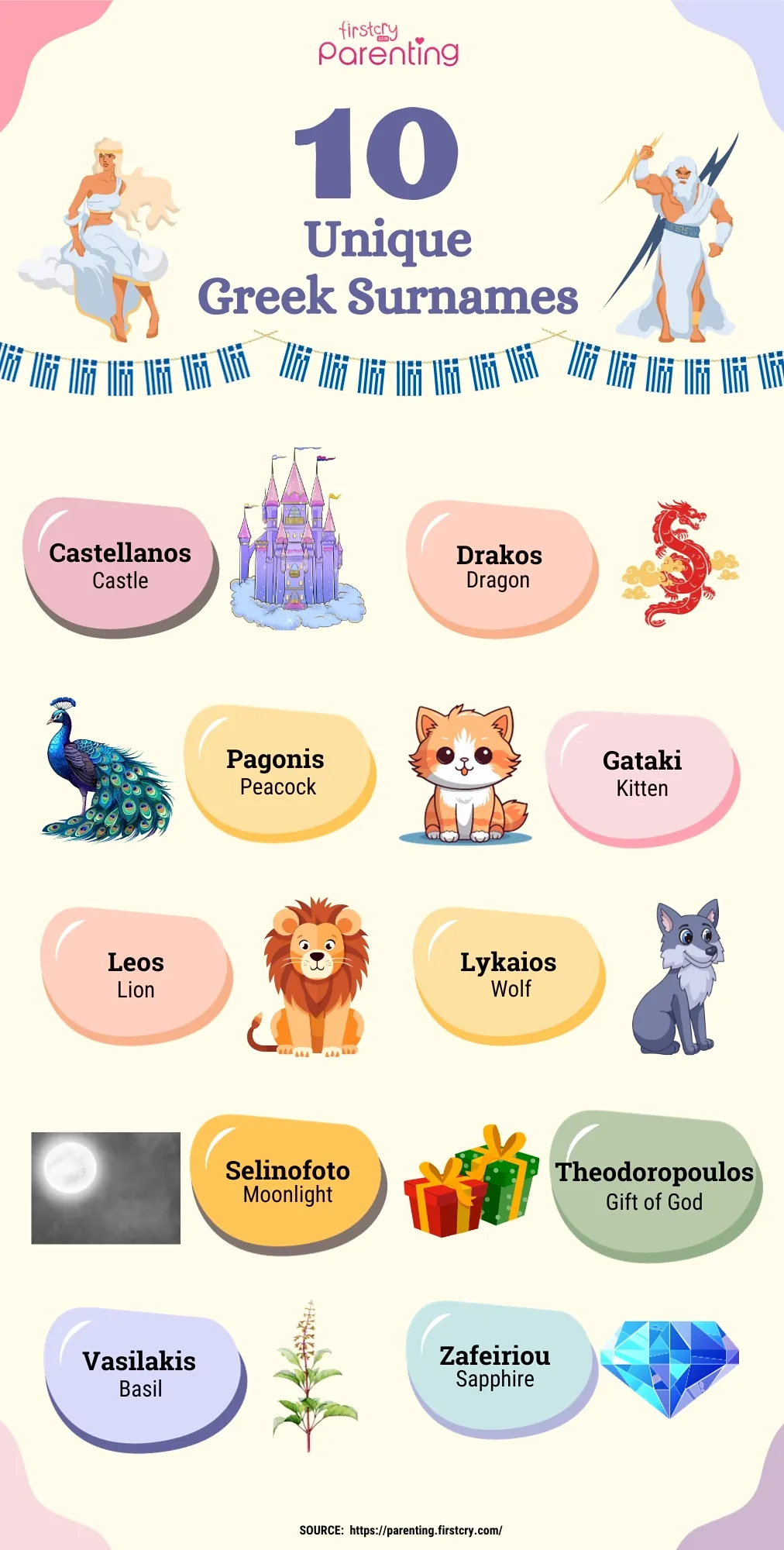Stepping into the world of Greek last names is like opening a history book, each name a unique chapter filled with tales of ancient traditions, geographical origins, and familial legacies. These surnames are not just identifiers; they are echoes of generations past, linking modern Greeks to their ancestors and the rich tapestry of Hellenic culture. From the rugged mountainsides to the bustling islands, every region and era has left its indelible mark on the surnames that endure today, carrying with them a story waiting to be told.
The origins of Greek surnames are as diverse as the country’s landscape. Many are patronymic, deriving from a father’s given name, often with suffixes indicating “son of” or “descendant of.” Others trace their roots to occupations, describing a family’s trade or craft. Geographical locations, from specific villages and towns to broader regions or even physical landmarks, also provided a common source for last names. And then there are those descriptive surnames, born from a distinguishing characteristic, a nickname, or an event that became synonymous with an individual or a family line.
Understanding these origins provides a fascinating glimpse into the lives of Greeks throughout history. It reveals how communities were formed, how individuals were identified within their villages, and how families forged their identities over centuries. Exploring greek last names and meanings offers more than just linguistic insight; it is a journey into the heart of Greek heritage, connecting us to the vibrant human stories that shaped this ancient civilization. Let’s delve into some examples and uncover the intriguing narratives behind them.
Exploring Fascinating Greek Last Names and Their Stories
-
Papadopoulos
This is arguably the most common Greek last name, literally meaning “son of a priest.” It combines “Papas” (priest) with the patronymic suffix “-poulos.” Its widespread prevalence reflects the significant role of the Orthodox Church in Greek society throughout history, where the local priest was often a central figure in the community.

The name likely originated from families where the patriarch was a priest, or perhaps even from families who served the church in some capacity. It’s a prime example of how deeply spiritual and communal life was intertwined in Greek culture, creating a lasting legacy through surnames.
-
Vasilopoulos
Meaning “son of a king” or “descendant of a king,” Vasilopoulos is derived from the Greek word “Vasileios,” which means “royal” or “king.” While not suggesting actual royal lineage for most, it hints at a connection to someone named Vasilios, a very popular given name in Greece, often associated with St. Basil the Great.
Like Papadopoulos, the “-poulos” suffix denotes parentage. This name could have been adopted by families whose ancestor was named Vasilios, or perhaps even by someone who carried themselves with a regal air or held a position of some authority within their community.
-
Nikolaidis
Another popular patronymic name, Nikolaidis translates to “son of Nikolaos” or “descendant of Nikolaos.” Nikolaos is a universally beloved name in Greece, associated with Saint Nicholas, the patron saint of sailors, merchants, and children, and is celebrated with great fervor.
The suffix “-idis” is common in Pontic Greek surnames, indicating origin from the Black Sea region. This last name therefore often signifies a connection to a specific regional heritage within Greece, while also honoring a venerated saint.
-
Karagiannis
This descriptive and patronymic surname literally means “Black John.” It is a combination of “kara” (from Turkish “kara,” meaning black, a common prefix in Greek surnames to describe hair, complexion, or even personality traits) and “Yiannis” (John).
The name likely originated from an ancestor named Yiannis who had dark hair or a darker complexion. It serves as a wonderful illustration of how physical descriptors or nicknames became formalized into family names, often reflecting the unique characteristics of an individual.
-
Economou
Economou means “steward,” “house manager,” or “economist.” It is derived from the Greek word “oikonomos,” which referred to someone who managed a household, an estate, or even the finances of a church or monastery. It is a clear example of an occupational surname.
Families bearing this name likely had ancestors who were respected for their organizational skills and trustworthiness, holding positions of responsibility within their communities. It highlights the importance of practical administration in historical Greek society.
-
Hatzis
The name Hatzis comes from the Greek word “Hadjis” or “Chatzis,” referring to someone who has completed a pilgrimage to a holy place, particularly Jerusalem. The prefix “Haj” or “Chatz” traditionally denotes a pilgrim, much like “Al-Haj” in Arabic cultures.
It was a title of great respect and honor, indicating deep piety and commitment to faith. When an individual returned from such a pilgrimage, they would often adopt this title as part of their name, which then became a hereditary surname for their descendants, celebrating a significant spiritual achievement.
-
Mavros
Mavros is a straightforward descriptive surname meaning “black.” It was likely given to an ancestor who had dark hair, dark eyes, or a darker complexion. It is one of the many color-based surnames found across various cultures.
Such simple yet effective descriptors were essential in smaller communities to differentiate individuals. Over time, what started as a nickname became a fixed surname, passed down through generations, still quietly hinting at the physical traits of an ancient forebear.
-
Galanis
This surname means “light blue” or “pale.” It’s another descriptive name, possibly referring to an ancestor with light colored eyes, fair hair, or a pale complexion. It stands in contrast to names like Mavros and provides another example of physical attributes becoming identifiers.
The use of color as a surname reflects a direct and often humorous way of categorizing people in the past. Galanis offers a glimpse into how individual characteristics, even seemingly minor ones, could become defining elements of a family’s identity.
-
Petrakis
Petrakis is a diminutive of “Petros,” meaning “stone” or “rock.” The “-akis” suffix is a common diminutive, particularly found in Cretan surnames, meaning “little” or “son of.” So, Petrakis essentially means “little stone” or “son of Petros.”
This name could have originated from an ancestor named Petros, or perhaps from someone who was small but resilient, like a little rock. It perfectly showcases how given names combine with regional suffixes to create unique and endearing last names.
-
Georgiou
Georgiou means “son of Georgios” or “descendant of Georgios.” Georgios (George) is another extremely popular given name in Greece, primarily due to Saint George, the revered patron saint of soldiers. It is derived from “georgos,” meaning “farmer” or “earth-worker.”
The name therefore combines both a patronymic origin and an occupational root, reflecting a legacy tied to the land and a connection to a widely admired saint. It’s a common and enduring surname, echoing the agricultural roots of much of historical Greek society.
The exploration of Greek surnames is truly a journey into the heart of a civilization rich with history, faith, and a deep sense of community. Each name, whether occupational, patronymic, geographical, or descriptive, carries an intrinsic story, a piece of the puzzle that makes up the vast and intricate mosaic of Greek identity. They remind us that our names are not just labels but living remnants of our collective past, connecting us to the struggles, triumphs, and daily lives of those who came before us.
Understanding these linguistic treasures allows us to appreciate the enduring cultural threads that weave through generations. It encourages a deeper connection to ancestry and provides a unique window into the fascinating evolution of language and society. The stories embedded within these names continue to resonate, inviting us all to reflect on the legacy we carry and the heritage we share.



